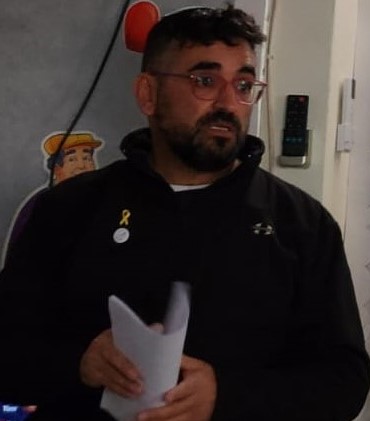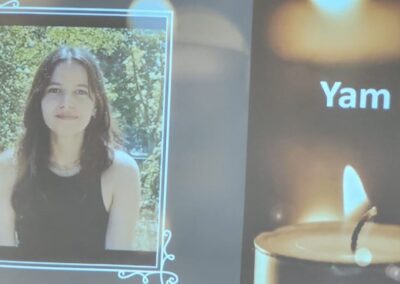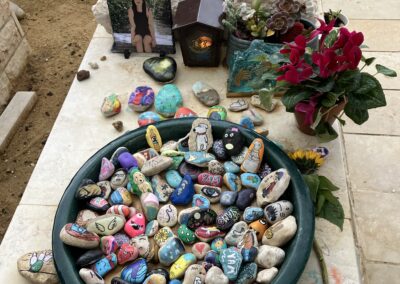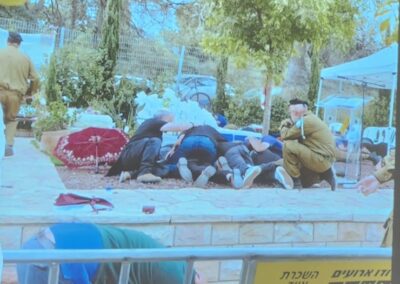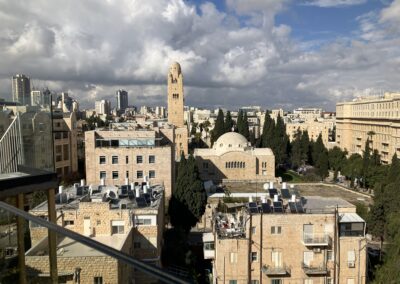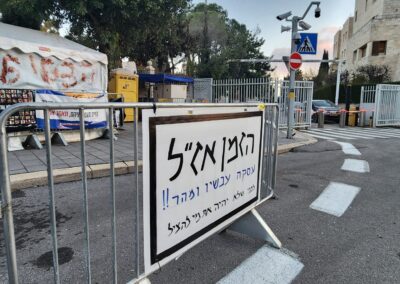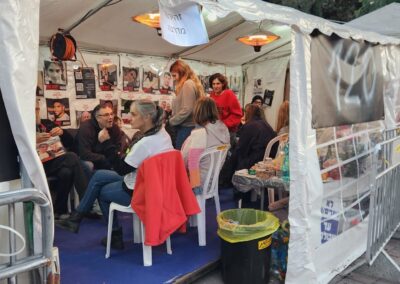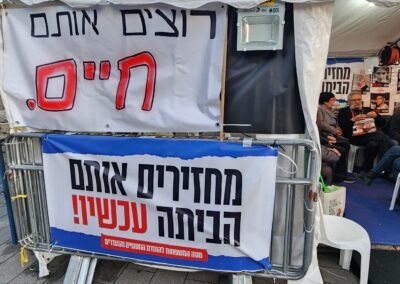2.2.24 Modi’in
It’s hard to believe that tomorrow is the last day of our solidarity mission!
This morning was “light.” The group engaged in a questioning and processing session for a few hours, with free time in between. Many of us aspired to walk the streets of Jerusalem on our own, which has surely been missing on our itinerary this week (for good reason), but it was freezing outside and raining cats and dogs. So, it was easy to sit in my room and catch up on emails and some work prep.
We left Jerusalem at 1 p.m. for Modi’in, a half hour away, and specifically for Yozma Reform Synagogue. One of their rabbis, who primarily heads their thriving day school, Rabbi David Azulay, crossed an historical boundary since October 7. He was the first non-orthodox rabbi to officiate at 6 funerals of fallen soldiers. Very briefly, it is the custom for a casualty officer to bring the grim news to family, organize the funeral with the family in the same shocking visit, assign a military orthodox rabbi and set the time of the funeral before the end of 24 hours. (I finally learned the reason that is given for the quick turnaround: In war, the deceased are buried quickly so that soldiers can go back to fighting as soon as possible. I found this reason somewhat “sketchy.”) There is no halakhic (legal) reason why a non-orthodox rabbi who is not a member of the official Military Rabbinate cannot officiate at a funeral but no one has ever tried to override the status quo. Apparently in Rabbi Azulay’s case, a bereaved family reached out to him, while the casualty officer was still in their house, saying they did not want an orthodox rabbi officiating at their daughter’s funeral and that they wished to add their own readings and order of the service. This new phenomenon gained newspaper exposure and thus, others followed suit, requesting R. Azulay. There were dozens and dozens of funerals each day for the first two weeks after October 7. Rabbi Azulay ironically served as a casualty officer during his army service 24 years ago. He shared with tears that he has come full circle and now sees clearly his role and purpose in the world and in Israeli society. Regrettably, the Israeli Military Rabbinate will not yet allow reform Rabbi Azoulay to join their ranks.
The photos represent the funeral of Yam Glass, whose family ended up crafting Yam’s entire funeral service. The funeral itself was interrupted by a Red Alert at which time the officer on duty (standing in the photo) directed everyone to get close to the ground until the sirens stopped – yet another Israeli reality check.
Rabbi Azoulay’s talk was followed by a visit to the military cemetery in Modi’in where it is an honor for soldiers to be buried, more than with their immediate family members. Our group sang psalms and chanted the memorial prayers, with not a dry eye among us. It was the apex of a sad week, realizing the loss, the absences of so many beautiful young people.
From there we bussed to a synagogue in a suburb of Jerusalem called Mevaseret Tzion, where we joined the congregation in kabbalat Shabbat, a service to welcome the Sabbath. We were divided up for home hospitality for dinner. If you believe in coincidences, consider this one: Our host, Dr. Maurit Be’eri (no relation to Kibbutz Be’eri, one of the decimated places in the south), is the CEO of Alyn Hospital in Jerusalem, a world-famous rehabilitative hospital for children with physical challenges. Fifty-five years ago, Alan and I met at Alyn (then housed in a monastery in Katamon, a very poor section of Jerusalem) and volunteered as companions to two young girls as our community service during our junior year of university study abroad. Alyn remains to this day a tzedakah (charity recipient) close to us. In 2022, the Alyn newsletter featured an article on us, and I was able to bring it up on my phone to show Maurit. Maurit and Ronen (a cardiologist) Be’eri have 3 adult children who also joined us. The family spent 2 years in Boston while Maurit studied at the Kennedy School of Harvard for a masters in public administration (they are no slouches, for sure). The kids were sent to the local Federation camp in Bridgeton, Maine — Camp Kingswood, where I also attended all those years ago. I look forward to finding even more connections with this lovely family!
Shabbat shalom to one and all! When I write tomorrow, I will be at the airport waiting for my overnight flight home.
6:30 a.m. 2.4.24 JFK Terminal 5
We arrived at Ben Gurion airport yesterday evening later than expected and thus, I did not manage to review the Sabbath day in writing. It was a “strong finish” as they say. Although many of my colleagues chose to sleep in or hike on an albeit chilly day, I had pre-registered to attend services at Har-El, the oldest Reform synagogue in Israel, established in 1958. The 10-minute walk to the synagogue for about 10 of us was invigorating in that inclement weather prevented most outdoor activities. The streets were empty, quiet, empty of tour busses, and even families walking to synagogue, ubiquitous in better times. The only noise in Jerusalem these days are protesters, families, friends, and supporters of hostages who have built tents and camped out in front of the Prime Minister’s house, which I glimpsed later in the day (photo). The 2-hour service was quite lovely, led by Rabbi Ava Zavidov, a native Israeli, and Cantor Evan Cohen, an American immigrant. Ordained cantors are quite unusual, even in Reform Israeli synagogues. The congregation is aging (a good fit for me), but with a stable membership of 70 families. Most Israeli congregations do not employ a professional cantor with their limited budgets. The salaries of Israeli Reform rabbis are paid by and large by the Israeli Reform movement. Congregations pay “out of pocket” based on their size. Cantors are not paid by the movement and only by the congregations they serve. It is a priority for Har-El to have Cantor Cohen, who also oversees overseas relations for the congregation as well as development and fundraising.
After a quick soup lunch at “First Train Station,” a derelict train station that had been converted to an artsy urban space about a decade ago, where most restaurants are open on the Sabbath, we returned to the “penthouse” of our hotel for our last two presentations. It was the only time I could get a decent photo of the view in daytime.
Orly Erez-Likhovski, now the head of the IRAC – the Israel Religious Action Center, the central address of Reform Judaism in Israel which is fighting for justice and equal rights for Reform Jews, women, Arabs, all marginalized populations, etc. The work of IRAC is done through the courts and primarily municipalities as the government, still representing a theocracy in Israel, is slow to recognize the legitimate petitions and advocacy of this group. Influencing public opinion is another important tool for their success. Orly is a renown lawyer, overseeing a staff of 30 lawyers and researchers. IRAC crafts petitions where they identify a need, and also, like Human Rights Commissions here in the US, responds to specific complaints in the workplace and anywhere. Orly enumerated ongoing cases that have been won, or not won yet, and also issues that have arisen since October 7.
IRAC’s successes include:
- Delegitimizing the attempt of ultra-orthodox Jews to force women to sit at the back of the buses in orthodox neighborhoods. This was a lawsuit on behalf of orthodox women who fear to use their own voices in protest,
- Enabling women to eulogize in cemeteries,
- Enabling women to anchor government-run radio news stations,
- Enabling LGBTQ+ couples to adopt children,
- Disqualifying candidates from Knesset elections who spout racism publicly (not always a clear path here, as we know),
- Enabling foreign wives who are victims of domestic abuse to receive legal status,
- Taking a major part in mobilizing the democracy protests, which succeeded in preventing the passing of the Reasonableness Law, which would have removed power from the Supreme Court, now one of the only ways to keep the extreme right-wing government in check. IRAC protested 40 weeks in a row and affirmed that public opinion and pressure matter.
And the list goes on…especially the ongoing attempt to establish a fully accepted egalitarian worship space adjacent to the Western Wall Since October 8, IRAC has focused on the injustices related to the firing of Arab workers in Israel, building bomb shelters in Druze settlements, maintaining public transportation even on the Sabbath in time of war, the right of LGBTQ+ bereaved families to receive government subsidies, and rights of women in combat units. Regarding the latter, we heard from a young member of the Har-el synagogue who served as a guard on the southern kibbutz border, a survivor, that the young women of this particular unit had complained for months that there were signs that a sneek attack was imminent, and their male commanders dismissed them. So many missed opportunities!
On the other hand, Orly offered that the crisis offers new opportunities: Most Israelis are voicing their desire for human rights for all, and want an election to depose Netanyahu. It should be noted in this long list of good work by IRAC, that some of it is on the Israeli agenda and some more important for the Jews abroad. Egalitarian worship is not a priority for Israelis while who is being drafted now (young secular men who are in the middle of their gap year) and who is not (young men for the more liberal yeshivot) is on the front page for Israelis.
Having heard the endless and passionate work of Orly and IRAC, I cannot help but want to support them to the extent possible, not only financially, but by keeping updated through their monthly newsletter and lifting our diaspora voices when requested.
We formally ended the mission in a study session with Professor Michael Marmur, PhD, Professor of Theology at HUC in Jerusalem, teacher extraordinaire, and mensch of the highest degree. It was a fitting climax. He taught through text, and identified himself as a “conditional Zionist,” that is, his love of Israel is predicated on several conditions, an impossible existential but absolutely necessary state of mind and heart. Etymologically, for all of us nerds, he re-interpreted founder of political Zionism, Theodor Herzl’s pivotal work Altneuland, which we usually translate as “Old New Land.” For Marmur, “altneu” is a Yiddish distortion of the Hebrew “al t’nai,” meaning “on the condition that.” Marmur deferred to Vivian Silver, a longtime peacenik in Israel who was murdered on October 7, who always said she was a “conditional Zionist,” meaning she is obligated to further the rights of her people to live in dignity and democracy insomuch that she needs to work for all others and their justice. The two must come hand in hand.
For Marmur, Palestinians are in dire straits right now. They are no less human beings than Jews are and they deserve what Jews deserve. That said, finding a reasonable strategy and end to the present crisis has been Israel’s greatest challenge since 1948. He encapsulated the situation by the following: Our traditional prayer for the State of Israel which we read in our worship service begins with Israel is raishit s’michat g’ulateinu – the beginning of the flowering of our redemption. G’ulah, redemption, has four meanings in Jewish text and tradition: (1) releasing and redeeming the captive, (2) performing acts of retributive or restorative justice on behalf of the person who died by another’s hand in order to restore justice and order (goel adam), (3) Defilement , i.e., staining, as in “one’s hands were defiled by blood” – this is the messy side to g’ulah, and (4) Separation or Detachment.
We need to face up to the dark side of the g’ulah. We need to be strong voices against those who want to take g’ulah to a messianic, exclusivist direction. What that looks like we don’t know; we can only maintain our moral values against the tide.
I am in Michael Marmur’s camp. Thank you all for indulging in my all too lengthy reflections. My heart is with Israel and with all the suffering innocents!
